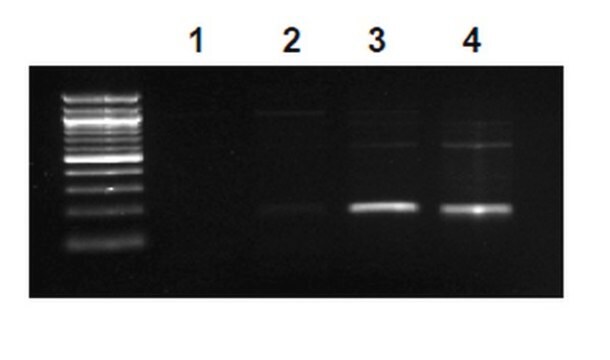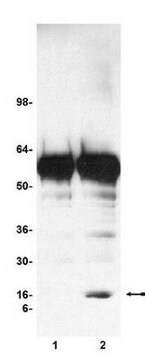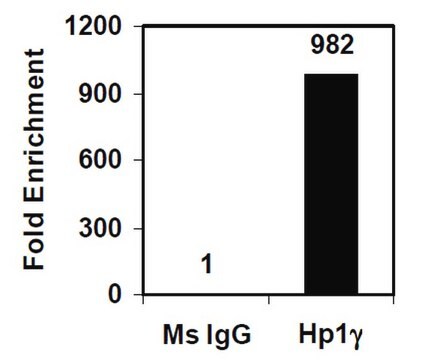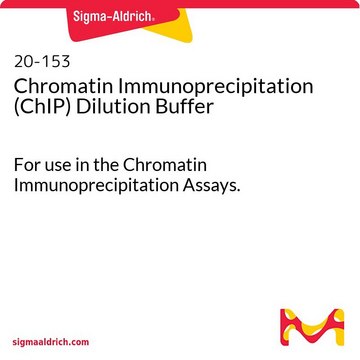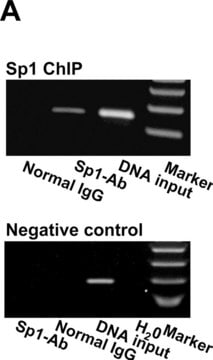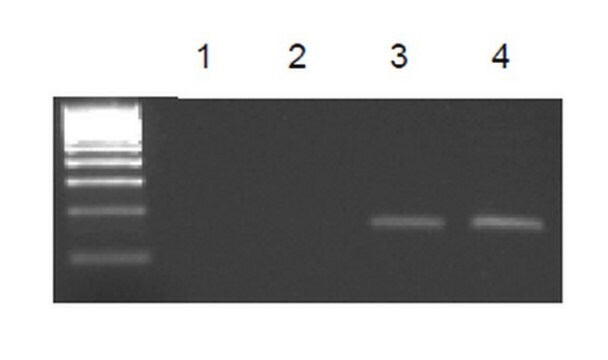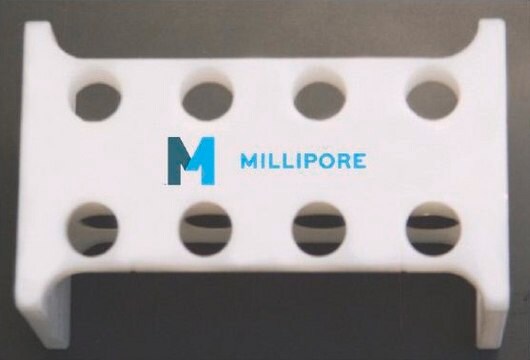17-10085
Magna ChIP® A/G Chromatin Immunoprecipitation Kit
Single day chromatin immunoprecipitation (ChIP) kit containing all necessary reagents to perform 22 individual chromatin immunoprecipitation (ChIP) reactions using magnetic A/G beads.
동의어(들):
Magnetic ChIP Kit, Magnetic Chromatin Immunoprecipitation
로그인조직 및 계약 가격 보기
모든 사진(3)
About This Item
UNSPSC 코드:
12161503
eCl@ss:
32161000
NACRES:
NA.52
추천 제품
일반 설명
Chromatin Immunoprecipitation (ChIP) is a powerful technique for mapping the in vivo distribution of proteins associated with chromosomal DNA. These proteins can be histone subunits and post-translational modifications or other chromatin associated proteins such as transcription factors, chromatin regulators, etc. Additionally, ChIP can be used to identify regions of the genome associated with these proteins, or conversely, to identify proteins associated with a particular region of the genome. ChIP methodology often involves protein-DNA and protein-protein cross-linking, fragmentation of the cross-linked chromatin, and subsequent immunoprecipitation of chromatin with an antibody specific to a target protein. The DNA fragments isolated in complex with the target protein can be identified by a variety of methods including PCR, DNA microarray and DNA sequencing. Standard or quantitative PCR can be performed to verify whether a particular DNA sequence (the gene or region of the genome) is associated with the protein of interest. The combination of ChIP and promoter or genomic tiling microarrays (ChIP-chip) allows genome-wide identification of DNA-binding sites for chromatin-associated proteins with precise resolution. Alternatively, high-throughput sequencing of libraries constructed from immunoprecipitated chromosomal DNA (ChIP-Seq) is a powerful alternative to ChIP-chip in mapping the protein-DNA interactions across mammalian genomes.
Unlike standard ChIP protocols that can be laborious and time consuming, the Magna ChIP kit protocol can reduce the amount of time required to perform a ChIP experiment from three days to one. Additionally, the smaller Magna ChIP reaction volume increases the relative concentration of the antibody enabling the ChIP reaction to be performed with reduced amounts of both antibody and sheared chromatin. Finally because this kit uses a blend of protein A and protein G beads, a wider range of antibody isotypes can be used than A or G alone. This allows a wider variety of antibodies to be used and avoids the need to purchase separate kits for protein A and protein G based immunoprecipitation. Because Magna ChIP kits use paramagnetic beads they are compatible with automated high throughput platforms, thus allowing a large number of ChIP reactions to be carried out simultaneously. Features & Benefits:
Chromatin Immunoprecipitation (ChIP) is an important technique allowing the analysis of in vivo interactions of proteins with genomic DNA. Any chromatin-associated or DNA binding protein can be analyzed with this technique, provided a good antibody to the protein exists. One can measure different proteins localized to a specific region of the genome, or the genome wide distribution of a specific protein. Another powerful application of this technique is to analyze changes in histone modifications that correlate with processes like transcription, mitosis or DNA repair.
- Magnetic bead-based rapid protocol allows performance of ChIP in as little as 1 day
- Blend of protein A+G bead blend allows ChIP using a broader range of antibodies than A or G alone
- Includes spin columns to make DNA purification easier and more reliable - no more messy phenol-chloroform extractions
- Complete kit with all required reagents for reliable and reproducible results
- Compatible with ChIPAb+ validated antibody and primer sets
Chromatin Immunoprecipitation (ChIP) is an important technique allowing the analysis of in vivo interactions of proteins with genomic DNA. Any chromatin-associated or DNA binding protein can be analyzed with this technique, provided a good antibody to the protein exists. One can measure different proteins localized to a specific region of the genome, or the genome wide distribution of a specific protein. Another powerful application of this technique is to analyze changes in histone modifications that correlate with processes like transcription, mitosis or DNA repair.
애플리케이션
Research Category
Epigenetics & Nuclear Function
Epigenetics & Nuclear Function
Used to detect/quantify: Protein A+G
포장
Kit capacity: 22 chromatin immunoprecipitation assays
성분
Magnetic Protein A/G Beads
ChIP Dilution Buffer
Low Salt Wash Buffer
High Salt Wash Buffer
LiCl Wash Buffer
TE Buffer
Cell Lysis Buffer
Nuclear Lysis Buffer
ChIP Elution Buffer (w/o Proteinase K)
Proteinase K
RNase A
10X Glycine
10X PBS
Protease Inhibitor Cocktail II
Spin Filters
Collection Tubes
Bind Reagent A
Wash Reagent B
Elution Reagent C
ChIP Dilution Buffer
Low Salt Wash Buffer
High Salt Wash Buffer
LiCl Wash Buffer
TE Buffer
Cell Lysis Buffer
Nuclear Lysis Buffer
ChIP Elution Buffer (w/o Proteinase K)
Proteinase K
RNase A
10X Glycine
10X PBS
Protease Inhibitor Cocktail II
Spin Filters
Collection Tubes
Bind Reagent A
Wash Reagent B
Elution Reagent C
물리적 형태
Two boxes containing all necessary reagents to perform 22 individual chromatin immunoprecipitation (ChIP) reactions. Supplied buffers are sufficient to generate chromatin from up to five 15 cm plates of cultured cells, each plate providing up to 10 chromatin preparations (varies with cell and assay type).
저장 및 안정성
Upon receipt, store components at the temperatures indicated on the labels. Kit components are stable for 1 year from date of shipment when stored as directed.
법적 정보
MAGNA CHIP is a registered trademark of Merck KGaA, Darmstadt, Germany
면책조항
Unless otherwise stated in our catalog or other company documentation accompanying the product(s), our products are intended for research use only and are not to be used for any other purpose, which includes but is not limited to, unauthorized commercial uses, in vitro diagnostic uses, ex vivo or in vivo therapeutic uses or any type of consumption or application to humans or animals.
신호어
Danger
유해 및 위험 성명서
Hazard Classifications
Acute Tox. 4 Oral - Aquatic Chronic 3 - Eye Irrit. 2 - Flam. Liq. 2 - Resp. Sens. 1 - Skin Irrit. 2
Storage Class Code
3 - Flammable liquids
Flash Point (°F)
55.4 °F
Flash Point (°C)
13 °C
시험 성적서(COA)
제품의 로트/배치 번호를 입력하여 시험 성적서(COA)을 검색하십시오. 로트 및 배치 번호는 제품 라벨에 있는 ‘로트’ 또는 ‘배치’라는 용어 뒤에서 찾을 수 있습니다.
이미 열람한 고객
The cross-talk between canonical and non-canonical Wnt-dependent pathways regulates P-glycoprotein expression in human blood-brain barrier cells.
Pinzon-Daza, ML; Salaroglio, IC; Kopecka, J; Garzon, R; Couraud, PO; Ghigo, D; Riganti, C
Journal of Cerebral Blood Flow and Metabolism null
A novel HIV-1-encoded microRNA enhances its viral replication by targeting the TATA box region.
Zhang, Y; Fan, M; Geng, G; Liu, B; Huang, Z; Luo, H; Zhou, J; Guo, X; Cai, W; Zhang, H
Retrovirology null
Human ?-defensin expression is not dependent on CCAAT/enhancer binding protein-? in a murine model.
Glenth?j, A; Dahl, S; Larsen, MT; Cowland, JB; Borregaard, N
Testing null
CREB regulates the expression of neuronal glucose transporter 3: a possible mechanism related to impaired brain glucose uptake in Alzheimer's disease.
Jin, N; Qian, W; Yin, X; Zhang, L; Iqbal, K; Grundke-Iqbal, I; Gong, CX; Liu, F
Nucleic Acids Research null
Yi-Chuan Cheng et al.
Developmental biology, 397(1), 116-128 (2014-12-03)
The study of molecular regulation in neural development provides information to understand how diverse neural cells are generated. It also helps to establish therapeutic strategies for the treatment of neural degenerative disorders and brain tumors. The Hairy/E(spl) family members are
관련 콘텐츠
Protein and nucleic acid interaction reagents and resources for investing protein-RNA, protein-DNA, and protein-protein interactions and associated applications.
자사의 과학자팀은 생명 과학, 재료 과학, 화학 합성, 크로마토그래피, 분석 및 기타 많은 영역을 포함한 모든 과학 분야에 경험이 있습니다..
고객지원팀으로 연락바랍니다.